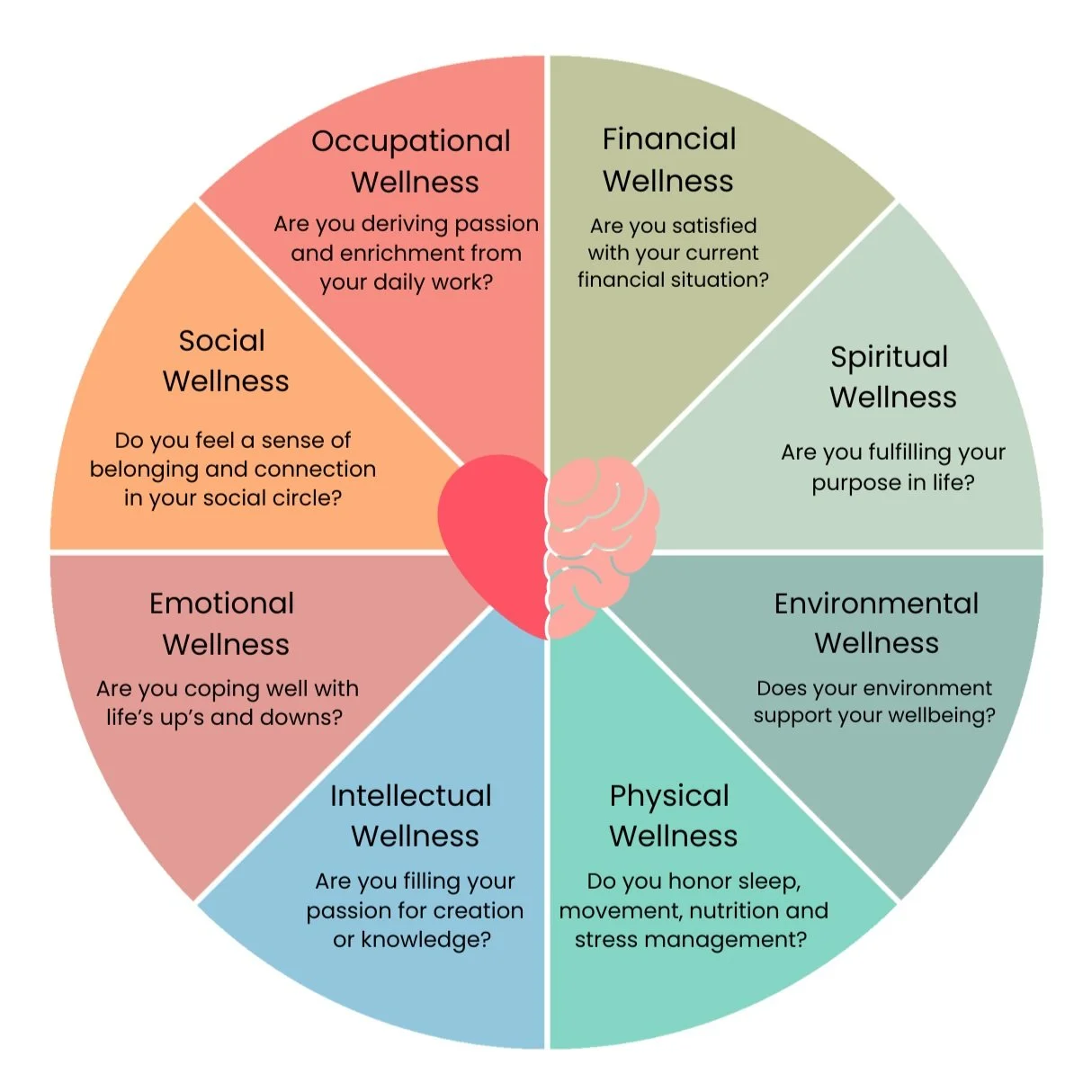The Invisible Architecture of Health: Understanding Your Wellness Blueprint
Think of your well-being not as a static state, but as a dynamic, ever-spinning Wheel of Wellness. Each spoke on this wheel represents a vital dimension of your life, and the smoother and more balanced these spokes are, the smoother and more joyful your ride through life will be. When one spoke is bent or broken, the whole wheel wobbles, making your journey feel, well, a little bumpy.
Let's pull back the curtain and explore how each of these dimensions, often operating in the quiet hum of your daily life, profoundly shapes your health.
Occupational Wellness: The Purpose-Driven Path
We spend a significant chunk of our waking hours in the realm of work, whether it’s a traditional job, caring for a family, or volunteering. Occupational wellness isn’t just about having a paycheck; it's about finding purpose, satisfaction, and a sense of contribution in what you do. It’s the feeling that your efforts, large or small, matter. When our work aligns with our values and strengths, it can be a powerful source of energy and fulfillment. But when it feels like a relentless grind, a soul-sucking obligation, the stress can seep into every corner of our lives, showing up as fatigue, irritability, and even physical ailments. It's the difference between building a cathedral and stacking bricks—both are work, but one resonates with meaning.
Actionable Tips:
Find Your "Why": Even in the most mundane tasks, try to connect your work to a larger purpose. If you're compiling data, how does that data ultimately help someone? If you're washing dishes, how does it contribute to a peaceful home environment?
Set Boundaries: The digital age has blurred the lines between work and personal life. Designate "off-duty" hours and stick to them. Resist the urge to check emails late at night or on weekends.
Seek Growth: Look for opportunities to learn new skills, take on new challenges, or mentor others. Growth keeps stagnation at bay and fosters a sense of accomplishment.
Mindfulness Exercise:
Take five minutes before starting your work for the day. Close your eyes, take a few deep breaths, and bring to mind one aspect of your work, no matter how small, that you find genuinely fulfilling or that helps someone else. Hold that feeling of purpose and contribution as you begin your tasks.
Social Wellness: The Power of Connection
Humans are inherently social creatures. From the earliest campfires to today’s bustling cities, our survival has always been intertwined with our ability to connect, cooperate, and belong. Social wellness isn’t just about having a lot of friends; it’s about cultivating meaningful relationships, having a support network, and feeling a sense of belonging to a community. Think of it like a dense forest: individual trees thrive, but the entire ecosystem is stronger because of the interconnected root systems, sharing resources and resisting storms together. Loneliness, on the other hand, can be as detrimental to your health as smoking, contributing to chronic inflammation and a weakened immune system.
Actionable Tips:
Quality Over Quantity: Focus on deepening existing relationships rather than just accumulating acquaintances. Reach out to one friend or family member this week for a genuine conversation.
Join a Group: Whether it's a book club, a hiking group, a volunteer organization, or a dance class, finding a community around a shared interest can create effortless connections.
Practice Active Listening: When you're with others, put away your phone and truly listen to what they're saying, both verbally and non-verbally. Show genuine interest.
Mindfulness Exercise:
Before your next social interaction, take a moment to set an intention. Choose to be fully present, to listen with an open heart, and to genuinely connect with the person in front of you. Notice how this shift in intention changes the dynamic of the conversation.
Emotional Wellness: Navigating Your Inner Landscape
Our emotions are like the weather: sometimes sunny, sometimes stormy, sometimes unpredictable. Emotional wellness isn't about being happy all the time; it's about acknowledging, understanding, and effectively managing your feelings, both positive and negative. It's the ability to bounce back from adversity, to adapt to change, and to build resilience. Imagine a ship navigating rough seas. Emotional wellness is the captain who knows how to read the currents, adjust the sails, and weather the storm without capsizing. Suppressing emotions, on the other hand, can be like trying to hold a beach ball underwater—eventually, it’s going to pop up with force, often at the least opportune moment.
Actionable Tips:
Name Your Feelings: Instead of saying "I feel bad," try to identify the specific emotion: "I feel frustrated," "I feel sad," "I feel anxious." Naming it helps you process it.
Practice Self-Compassion: Treat yourself with the same kindness and understanding you would offer a good friend. When you make a mistake or feel overwhelmed, avoid harsh self-criticism.
Develop Coping Strategies: Identify healthy ways to deal with stress and difficult emotions, such as exercise, journaling, talking to a trusted friend, or engaging in a hobby.
Mindfulness Exercise:
When you feel a strong emotion arise, pause. Instead of reacting immediately, bring your attention to your body. Where do you feel this emotion? Is it a tightness in your chest, a knot in your stomach? Simply observe the physical sensations without judgment, allowing the feeling to be there without getting swept away by it.
Environmental Wellness: Our Interconnected World
We don't exist in a vacuum; we are inextricably linked to the world around us. Environmental wellness is about understanding how your physical and social environments impact your well-being, and in turn, how your actions impact the health of the planet. This can range from the air you breathe and the water you drink to the cleanliness of your home and the noise levels in your neighborhood. It's also about a sense of responsibility for the Earth's resources. Think of a fish in a polluted pond: no matter how strong the fish, its health will inevitably decline if its environment is toxic. Similarly, a cluttered, chaotic home environment can mirror and exacerbate internal stress.
Actionable Tips:
Quality Over Quantity: Focus on deepening existing relationships rather than just accumulating acquaintances. Reach out to one friend or family member this week for a genuine conversation.
Join a Group: Whether it's a book club, a hiking group, a volunteer organization, or a dance class, finding a community around a shared interest can create effortless connections.
Practice Active Listening: When you're with others, put away your phone and truly listen to what they're saying, both verbally and non-verbally. Show genuine interest.
Mindfulness Exercise:
Before your next social interaction, take a moment to set an intention. Choose to be fully present, to listen with an open heart, and to genuinely connect with the person in front of you. Notice how this shift in intention changes the dynamic of the conversation.
Intellectual Wellness: The Curious Mind
The human brain is an astonishing organ, constantly seeking novelty, understanding, and growth. Intellectual wellness is about engaging your mind in creative and stimulating activities, expanding your knowledge, and embracing lifelong learning. It's the thrill of discovering something new, the satisfaction of solving a complex problem, or the quiet joy of getting lost in a good book. Think of your mind as a garden: if you neglect it, weeds will grow, and the soil will become barren. But if you cultivate it with new ideas, challenges, and curiosity, it will blossom with vibrant understanding and fresh perspectives. A stagnant mind, much like an unused muscle, begins to atrophy.
Actionable Tips:
Read Widely: Step outside your usual genres. Pick up a non-fiction book about a topic you know nothing about, or delve into a classic novel.
Learn Something New: This doesn't have to be formal education. It could be learning a new recipe, attempting a new craft, picking up a few phrases in a new language, or exploring a historical period.
Engage in Problem-Solving: Play brain games, do puzzles, or simply try to think critically about everyday challenges.
Mindfulness Exercise:
Choose an everyday object – a pen, a leaf, a coffee mug. For one minute, examine it as if you've never seen it before. Notice its colors, textures, reflections, and how it feels in your hand. Engage your curiosity fully with this simple act of observation.
Physical Wellness: The Foundation of Being
Our bodies are our vehicles through life, and their well-being is the bedrock upon which all other dimensions of wellness rest. Physical wellness encompasses all aspects of maintaining a healthy body: regular physical activity, balanced nutrition, adequate sleep, and responsible self-care. It's not about achieving a "perfect" body, but about treating your body with respect and providing it with what it needs to function optimally. Imagine a finely tuned engine: if you neglect the oil changes, use low-quality fuel, or ignore the warning lights, it won't perform efficiently, and eventually, it will break down. Our bodies are no different; they whisper before they shout.
Actionable Tips:
Move Your Body Daily: Find an activity you enjoy and incorporate it into your routine, whether it's a brisk walk, dancing, cycling, or gardening. Aim for consistency over intensity.
Nourish from Within: Focus on whole, unprocessed foods. Think vibrant fruits and vegetables, high-quality proteins, and healthy fats. Listen to your body's hunger and fullness cues.
Prioritize Sleep: Aim for 7-9 hours of quality sleep per night. Create a relaxing bedtime routine and make your bedroom a sanctuary.
Mindfulness Exercise:
As you go about your day, take a few moments to notice your breath. Feel the sensation of the air entering and leaving your body. Pay attention to how your chest and abdomen rise and fall. When you eat, chew slowly and savor each bite, noticing the flavors, textures, and aromas.
Spiritual Wellness: The Search for Meaning
This is perhaps the most profound and personal spoke on the wheel. Spiritual wellness isn't necessarily about religion, though it can certainly be a part of it. Instead, it's about finding meaning, purpose, and values in your life. It's about connecting to something larger than yourself, whether that's nature, a community, a higher power, or a personal philosophy. Think of it as your inner compass, guiding your choices and providing a sense of direction when life feels chaotic. When we lack a sense of purpose or meaning, life can feel adrift, leading to feelings of emptiness or existential angst.
Actionable Tips:
Reflect on Your Values: What truly matters to you? Write down your top 3-5 core values and consider how they show up (or don't show up) in your daily life.
Practice Gratitude: Regularly acknowledge the good things in your life, no matter how small. Keeping a gratitude journal can be a powerful practice.
Engage in Acts of Service: Helping others, volunteering, or simply performing small acts of kindness can foster a deep sense of connection and purpose.
Mindfulness Exercise:
Before you go to sleep, or upon waking, take a moment to reflect on something you are truly grateful for in your life. Let that feeling of gratitude expand throughout your body, noticing its warmth and lightness. Hold it for a few breaths.
Financial Wellness: Cultivating Prosperity Through Holistic Principles
Financial wellness, at its core, is not merely about the size of your bank account, but about fostering a harmonious relationship with your resources that supports your overall well-being. It's an integral component of a holistic life, interwoven with your mental, physical, spiritual, and communal health. By applying holistic principles to your finances, you can build a foundation for lasting security, freedom, and peace of mind.
Just as mindful eating nourishes the body, mindful money management nourishes your financial health. This principle emphasizes awareness, intention, and emotional intelligence in your financial decisions.
Mindfulness Exercises:
The "Pause and Reflect" Purchase: Before making any non-essential purchase, especially online, pause for at least 60 seconds. Ask yourself: "Do I truly need this? How will this impact my long-term goals? Am I buying this out of habit, boredom, or true desire?" Take a deep breath before clicking "add to cart" or pulling out your wallet.
Gratitude for Your Income: At the beginning of each pay period, take a moment to express gratitude for your income, regardless of the amount. Acknowledge the effort you put in and the opportunities it provides. You can do this by simply saying "thank you" aloud or writing it down.
The Debt Visualization Release: If you have debt, visualize a debt payment you've made. As you make the payment (even if it's automatic), imagine the weight of that debt lifting from your shoulders. Acknowledge the progress, no matter how small.
Actionable Tips:
Implement a "No-Spend Day" Weekly: Choose one day a week where you commit to spending no money at all. This practice builds awareness of unnecessary expenditures and strengthens your financial discipline.
Automate Savings: Set up automatic transfers from your checking to your savings account immediately after you get paid. Even small, consistent amounts add up over time. Treat savings like a non-negotiable bill.
Create a "Values-Based Budget": Instead of just listing categories, assign your spending to your core values (e.g., "experiences," "education," "community," "health"). This helps you see if your money is truly aligning with what matters most to you.
Schedule a Weekly Money Check-in: Dedicate 15-30 minutes each week to review your bank accounts, credit card statements, and budget. This regular check-in reduces anxiety and keeps you informed.
Quick Recap:
Each person is genetically unique. One person’s needs will vary from another’s. How we’re raised, our genetic makeup, personality composition, and our environment all play a significant role in shaping how we approach life. By listening to our bodies and utilizing science-based tools like the Wheel of Wellness, we can develop a more personalized wellness approach tailored to our unique individual needs.
The Bio-Individuality Factor: One Size Does Not Fit All




















